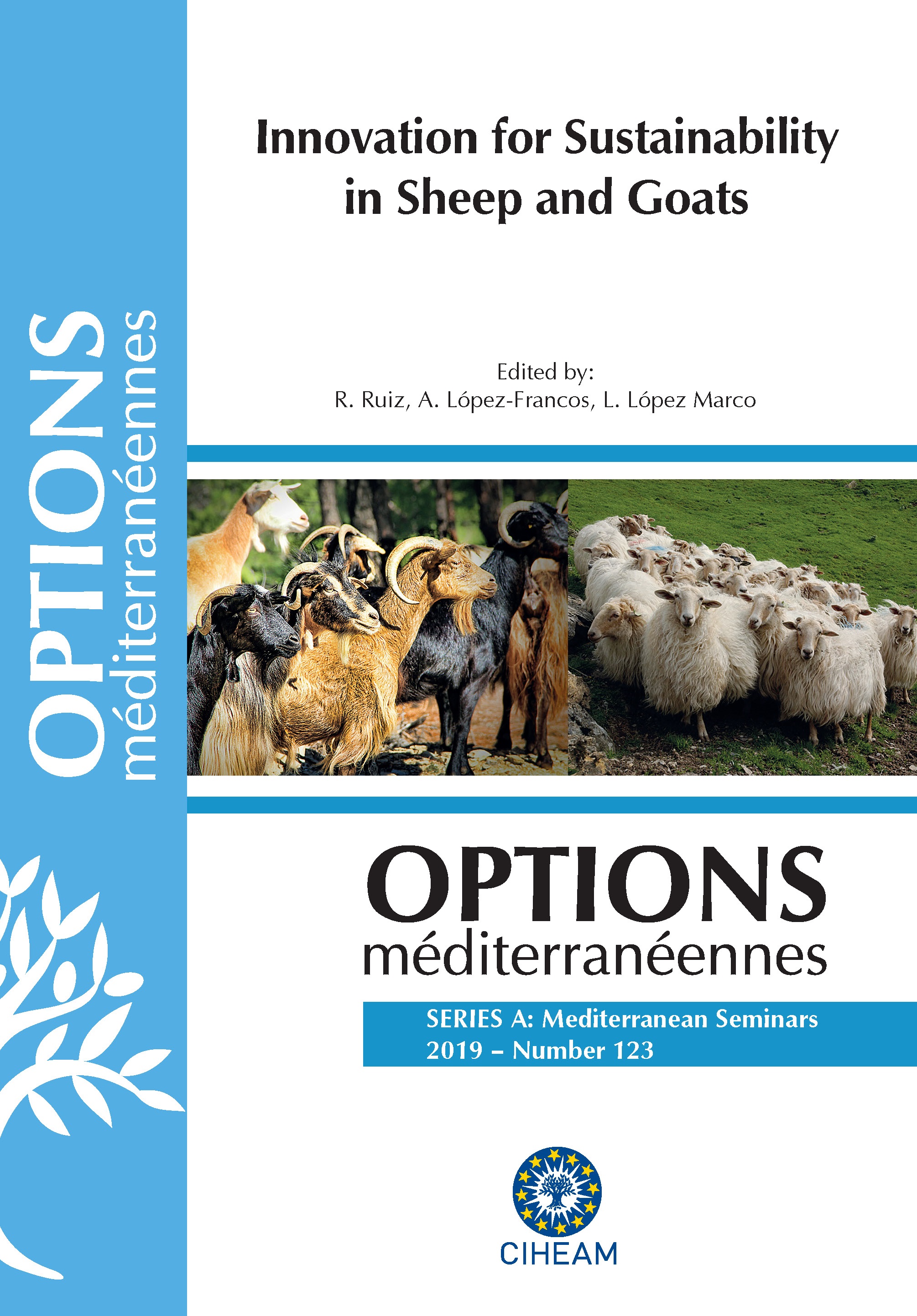| Article précédent | p. 195-200 | Article suivant |
Early weaning of kid goats does not compromise rumen microbial colonization and post-weaning digestive capacity
Milk feeding in intensive dairy farming represents a significant cost, which can potentially be reduced if the animal is weaned early. However, an abrupt transition from milk to solid feed may affect animal’s growth, appropriate rumen development and future digestive capacity. This experiment was conducted to assess the effect of an early weaning (EW) practice (5 weeks of life) on rumen microbial colonization and post weaning digestive ability against the normal weaning (NW) practice in diary goats farming (7-8 weeks). Twelve new-born kid goats were used and randomly allocated to one of the two experimental groups (n=6). They were provided mothers colostrum for 24 hours and then taken away and fed commercial milk replacer following the manufacturer guidelines. Alfalfa hay and starter concentrate pellets were available from week one after birth. After weaning, animals were kept together until 6 months of life. Then rumen content samples were collected and a digestibility trial was conducted. The weights of kid goats did not differ EW and NW until month six of life and both groups experienced a temporal decline in weight gain during the 7-10 days after weaning (more pronounced in EW). The fermentation pattern and microbial biomass were not different between groups. At month six of life neither the fermentation pattern nor the apparent digestibility differ between groups. Our results suggest that an early weaning strategy is possible and does not compromise the future digestive efficiency of the animal.
L’allaitement dans les systèmes laitiers intensifs représente un coût important, qui peut être réduit par le sevrage précoce. Cependant, une transition brusque vers l’allaitement maternel et les aliments solides peut affecter la croissance animale, le développement approprié du rumen et la capacité digestive à l’avenir. Cette étude a été réalisée pour évaluer l’effet d’une pratique de sevrage précoce (EW, 5 semaines de vie) sur la flore microbienne du rumen et la capacité digestive après le sevrage, en fonction du temps de sevrage habituel (NW, 7-8 semaines) chez les chèvres laitières. Douze chèvres (nouveaux-nés) ont été choisies et utilisées aléatoirement pour chaque groupe expérimental (n = 6). Le colostrum de leur mère a été administré à chaque chevreau pendant 24 heures, puis retiré d’eux et on a fourni du lait commercial reconstitué selon les indications du fabricant. Une luzerne et des granulés concentrés sont fournis librement aux chèvres dès la première semaine de la naissance. Après le sevrage, les animaux ont été maintenus ensemble jusqu’à l’âge de 6 mois, date à laquelle des échantillons de contenu ruminal ont été prélevés et un essai de digestibilité a été mené. Les poids des chevreaux ne diffèrent pas entre EW et NW jusqu’au sixième mois de vie et les deux groupes ont subi une interruption du gain de poids au cours des 7 à 10 jours suivant le sevrage (plus remarquable dans EW). Le schéma de fermentation et de la biomasse microbienne n’était pas différent entre les groupes, à l’exception des champignons, dont la concentration était plus faible chez les chevreaux EW. À six mois de vie, ni le modèle de fermentation ni la digestibilité apparente n’étaient différents entre les deux groupes. Nos résultats suggèrent qu’une stratégie de sevrage précoce est possible sans compromettre l’efficacité digestive de l’animal à l’avenir.
- [ Afficher ]
- [ Télécharger ]
- [ Exporter la citation ]
Vous pouvez télécharger la citation au format :
- [ Imprimer ]
-
Mots-clés
CAPRIN, DEVELOPPEMENT, FLORE MICROBIENNE, RUMEN, SEVRAGECiter cet article
Yáñez Ruiz D.R., Martínez E., Jiménez E., Serrano R., Belanche A., Martín García A.I. Early weaning of kid goats does not compromise rumen microbial colonization and post-weaning digestive capacity. In : Ruiz R. (ed.), López-Francos A. (ed.), López Marco L. (ed.). Innovation for sustainability in sheep and goats. Zaragoza : CIHEAM, 2019. p. 195-200. (Options Méditerranéennes : Série A. Séminaires Méditerranéens; n. 123). 2. Joint Seminar of the Subnetworks on Nutrition and on Production Systems of the FAO-CIHEAM Network for Research and Development in Sheep and Goats, 2017/10/03-05, Vitoria-Gasteiz (Spain). http://om.ciheam.org/om/pdf/a123/00007885.pdf



